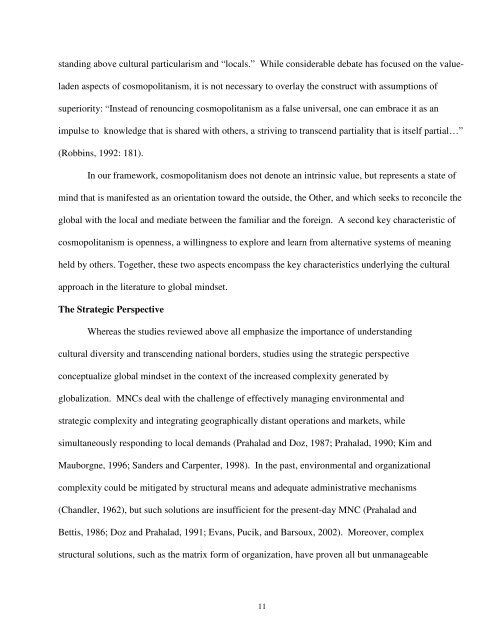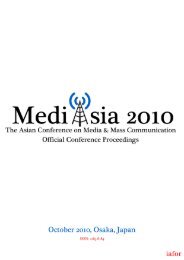What We Talk About When We Talk About “Global Mindset”
What We Talk About When We Talk About “Global Mindset”
What We Talk About When We Talk About “Global Mindset”
Create successful ePaper yourself
Turn your PDF publications into a flip-book with our unique Google optimized e-Paper software.
standing above cultural particularism and “locals.” While considerable debate has focused on the value-<br />
laden aspects of cosmopolitanism, it is not necessary to overlay the construct with assumptions of<br />
superiority: “Instead of renouncing cosmopolitanism as a false universal, one can embrace it as an<br />
impulse to knowledge that is shared with others, a striving to transcend partiality that is itself partial…”<br />
(Robbins, 1992: 181).<br />
In our framework, cosmopolitanism does not denote an intrinsic value, but represents a state of<br />
mind that is manifested as an orientation toward the outside, the Other, and which seeks to reconcile the<br />
global with the local and mediate between the familiar and the foreign. A second key characteristic of<br />
cosmopolitanism is openness, a willingness to explore and learn from alternative systems of meaning<br />
held by others. Together, these two aspects encompass the key characteristics underlying the cultural<br />
approach in the literature to global mindset.<br />
The Strategic Perspective<br />
Whereas the studies reviewed above all emphasize the importance of understanding<br />
cultural diversity and transcending national borders, studies using the strategic perspective<br />
conceptualize global mindset in the context of the increased complexity generated by<br />
globalization. MNCs deal with the challenge of effectively managing environmental and<br />
strategic complexity and integrating geographically distant operations and markets, while<br />
simultaneously responding to local demands (Prahalad and Doz, 1987; Prahalad, 1990; Kim and<br />
Mauborgne, 1996; Sanders and Carpenter, 1998). In the past, environmental and organizational<br />
complexity could be mitigated by structural means and adequate administrative mechanisms<br />
(Chandler, 1962), but such solutions are insufficient for the present-day MNC (Prahalad and<br />
Bettis, 1986; Doz and Prahalad, 1991; Evans, Pucik, and Barsoux, 2002). Moreover, complex<br />
structural solutions, such as the matrix form of organization, have proven all but unmanageable<br />
11









